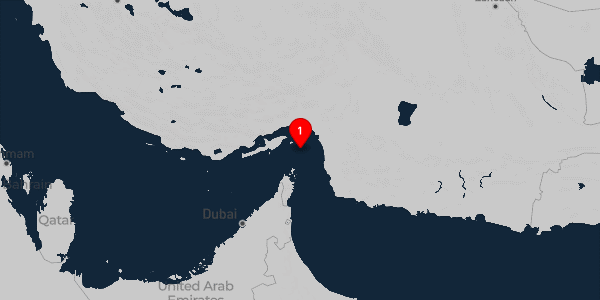
AMBREY THREAT CIRCULAR > US INTERVENTION IN THE ISRAEL-IRAN CONFLICT
Source: This document has been approved for distribution by Ambrey Analytics Ltd.
Updated:
This supersedes Ambrey Threat Circular – Israel’s Pre-emptive Strike, dated 13 June 2025, and Threat Circular – Red Sea Crisis, dated 18 June 2025.
A. Executive Summary
- Iran is assessed almost certain to respond militarily to the US strikes on nuclear facilities.
- This is likely to include attacks or seizures of US-affiliated shipping.
- If there is a “closure” of the Strait of Hormuz, this is more likely to be targeted, focused on US and Israeli shipping.
- It is not clear that the US intervention has ended.
- The Houthis have also vowed to respond.
- There has been some business disruption to merchant shipping.

B. SITUATION
On 22nd June, the US struck targets within Iran. The US operation was focused on degrading the Iranian nuclear programme. The US military reported initial battle damage assessments of “extremely severe damage and destruction” at the sites. However, to understand the overall impact on Iran’s nuclear programme, considerably more information is needed.
The Iranian government has publicly refused negotiations whilst under attack. The Israeli government expressed strong scepticism of whether the negotiations were ever in good faith. American statements indicate they are willing to restart negotiations, but it is unclear if the US intervention is over, and it is almost certain that Iran will respond militarily to the attacks, which could lead to further escalation. Israeli military operations have been broader in scope. Following the Israeli military campaign, started on 13th June, Israel and Iran have targeted nuclear sites, military sites, and some sites of military and economic importance. They have not targeted merchant shipping directly.
On 21st June, the Houthi military spokesperson issued a threat toward US shipping in the Red Sea if there was US involvement in aggression against Iran. On 22nd June, it was reported that the Houthi military had been given “directives” to counter the US.
Following the US operation, it was reported that the Iranian Parliament had authorised the “closure” of the Strait of Hormuz. A semi-official news outlet reported: “Iran has several options. These include attacks on…American bases in the region…, the closure of the Strait of Hormuz…, and a change in its nuclear doctrine…A direct military response remains the most probable next step.” The nuclear programme has highly enriched uranium, but a public change in nuclear doctrine need not precede a nuclear breakout.
C. THREAT UPDATE
At the time of writing, no merchant shipping has been damaged or seized, but the risk to Israel- and US-affiliated shipping is assessed to be high.
Ambrey has noted that five publicly US-affiliated merchant ships departed the Arabian/Persian Gulf since the US military operations. None publicly affiliated with the US appear to have entered since the operations. Ambrey is aware of at least five merchant ships that were destined to enter the Arabian/Persian Gulf but about-turned or chose to wait. At least two of these did not bear a public US-affiliation, indicating broader concern in the market. Several US-flagged merchant ships have gathered in UAE territorial seas.
Whilst the stated threat to the Strait of Hormuz has been non-specific, It is more likely that if Iran were to declare the Strait closed, it would be to certain affiliations. A complete closure would be to the detriment of Iran’s relations with its neighbours and disruptive to the world’s economy, which would impact its partners. It is assessed unnecessary to do this. There has been no designation of a combat area, which might disrupt shipping at large.
In the Red Sea and Gulf of Aden, Ambrey assesses that targets have not been available to the Houthis, and this explains the lack of incidents. It is assessed likely that they will resume the targeting of US-affiliated shipping in the region when the opportunity arises. There are few US-affiliated vessels that transit the region. In Ambrey’s 18th June Threat Circular about the Red Sea Crisis, it was mentioned that since the US-Houthi ceasefire on May 6th, only one publicly US-affiliated merchant ship has passed through the Bab al Mandab. In Israel, no merchant ships have been damaged. Merchant shipping has been disrupted during port operations. During attacks on port cities, port alarms have sounded, operations temporarily suspended, and crews were advised to take shelter. Operations can resume within an hour of the alarms sounding. Gas facilities offshore Israel suspended operations.
D. MITIGATION
- Affiliation checks against the Iran target profile: Ambrey recommends a thorough affiliation check as part of a transit risk assessment is performed for Arabian Sea, Gulf of Oman, Arabian/Persian Gulf, Gulf of Aden and southern Red Sea voyages. Ambrey continues to adjust these as per the developing intent and threat.
- Ambrey recommends that shipping companies do this in advance, as we received requests for support that were already underway in the region at the time of the military strikes.
- Shipping companies are welcome to have a conversation with Ambrey to talk through scenarios.
- Vessels strongly affiliated with the target profile are advised to avoid the Arabian Sea, Gulf of Oman, Arabian/Persian Gulf, Gulf of Aden and southern Red Sea where possible.
- If the company is in these regions, it would be advised to limit aggregate risk, by people, hull, and value to an acceptable level.
- Ship Security Assessments: Merchant shipping assessed to be at heightened risk is advised to carry out Ship Security Assessments tailored to the threat, and to implement recommended and proportionate ship protection measures before sailing.
- Bridge support: Unarmed advisors to prepare and reassure crew and assist with military liaison. Digital operations can also support with route planning, voyage preparation, and keep the bridge and shore staff informed of any changes in risk while enroute.
E. CONTACT INFORMATION
Ambrey: +44 203 503 0320 – intelligence@ambrey.com
AMBREY – For Every Seafarer, Every Vessel, Everywhere.
END OF DOCUMENT